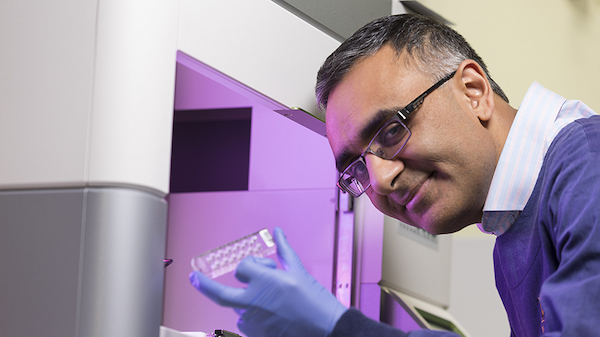Could the immune system hold the key to curing follicular lymphoma?

Professor Maher Gandhi leads the first research group in the world to investigate a new therapeutic approach for follicular lymphoma (FL) that includes harnessing a patient’s own immune system.
“We need a new way of looking at things,” said Professor Gandhi, who was recently appointed CEO of Mater Research (Brisbane).
While several groups around the world are looking at the properties of cancer cells, his Brisbane-based research team is “spending a lot of time on the properties of the immune cells” in FL.
And he’s expecting “a big breakthrough” later this year for this research project that recently was awarded funding of $200,000 as part of the Leukaemia Foundation’s National Research Program*.
Trying to cure an incurable subset of FL
Prof. Gandhi’s interest in follicular lymphoma – the second most commonly diagnosed form of lymphoma – is both personal and professional.
“A lot of my patients have this [FL] and I find it very challenging that we can’t cure them, so it’s always been a passion of mine to try and cure it,” said Prof. Gandhi.
“We can cure FL in a small subset, and to try and extend that to a bigger subset is something I feel very motivated by.
“There also are particular features of this lymphoma, from a scientific point of view, that have always intrigued me. And I’ve always believed FL was a cancer influenced by the immune system.”
FL occurs in older patients and there are two kinds. In 15-20% of cases, the FL is “very isolated in a small group of lymph nodes”. For the other 80-85% of cases, “it’s more advanced”.
“What’s interesting is that in the small group, it seems FL is curable in a proportion of them, but in the other patients, it’s incurable – it can be treated and controlled but it comes back, and it never goes away,” said Prof. Gandhi.
“What we want to do is look at that small group and find out what the molecular features are that actually means that it can go away. Our data so far suggests it’s due not so much to the biology of a lymphoma cell, but the surrounding immune cells.
“In some cases, those immune cells are very common, and these patients do much better. In other cases, the immune cells are hardly there at all, and they do much worse.
“If we can confirm this, it’s quite important, because it might suggest that the best way to treat FL is to profile the tumour at diagnosis and in cases where very few immune cells have infiltrated the lymphoma, we could possibly design new therapies that actually cause the immune cells to infiltrate the lymphoma.
“Maybe we should be using the patient’s own immune system to help fight their lymphoma,” said Prof. Gandhi.
“We’ve looked at a group of Brisbane patients, have confirmed our findings with groups internationally, and now we’re trying to confirm the findings in larger groups of patients including a group of patients from a clinical trial.
“This involves working with investigators at the Peter MacCallum Cancer Centre (Melbourne).”
A new approach
Prof. Gandhi explained that some patients with FL are treated with chemotherapy, some with antibody therapy, some have radiotherapy, and some get all three.
“We don’t know which is best, or what combination is best, but we do know that even by giving all three therapies, there are some patients who aren’t cured.
“So whatever we do, it’s not ideal. We need a new way of looking at things which is why we’ve taken the approach we have, because it suggests that we need a new approach that harnesses the patient’s own immune system as well.
Prof. Gandhi said initial funding for this research, from the National Health and Medical Research Council, was very important.
“It meant I could finally do that [comprehensively analyse early stage FL], but the monies were never enough to answer all the questions, so the additional funding from the Leukaemia Foundation will really enable me to address this properly and more rapidly,” he said.
“It will be used to appoint a post-doctoral researcher to work on this project for two years, starting in July.
“Because we had already started work with the NHMRC funding, we’re going to have some results this year.
“Our work is very advanced. Our results are very interesting indeed. We are quite excited by the findings.
“I expect we’ll get our big breakthrough this year,” said Prof. Gandhi.
“We’re hoping to show that we can identify people who are more likely to do badly and that it is related to their immune system. And our work might be the basis of a clinical trial in which we could test this.”
*This funding is part of the Leukaemia Foundation’s Strategic Ecosystem Research Partnerships (SERP) and was made possible thanks to generous individual supporters and the estates of Beverly Simersall and Dorothy Ruth Forest.